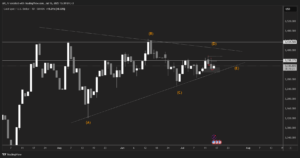European markets are pointing to a stronger start after Wall Street finished lower and as oil prices extend gains.
· German consumer confidence falls again, DAX rises
· US consumer confidence is expected to fall – USD falls for a fourth straight day
· Oil rises on tight supply, boosting CAD
Wall Street started the week on the back foot, struggling to extend the rebound from the previous week. Rising oil prices fueled inflation fears, and treasury yields pushed higher. On the data front, both US durable goods orders and pending home sales came in better than expected but failed to boost the market mood. On a sector level, energy stocks outperformed, tracking oil prices higher, while the prospect of higher interest rates hurt demand for tech stocks.
Oil prices continue to gain, helping to buoy the FTSE futures. The UK index is set to open 0.6% higher after gains of 0.7% on Monday, thanks to the heavyweight oil majors. Meanwhile, the DAX is set to open 0.2% higher after rising 0.5% in the previous session.
German consumer confidence
Consumer morale in the eurozone’s largest economy slips as inflation remains elevated at record levels. The GFK consumer confidence index dropped to -27.4 in July, down from -26.2 in the previous month, as shoppers struggle with rising prices and fears of recession grow.
The data comes as Russia pushes the German economy to the brink by slowing gas supplies. German industries that rely heavily on gas may be forced to downscale or close should supplies fall too low, which could devastate the economy.
Both the euro and the DAX are shrugging off the weak data.
Looking ahead
The US economic calendar shows several mid-tier US data points, including the housing price and Richmond Fed manufacturing indexes. The most closely watched will be the Conference Board consumer confidence, which is expected to fall to 100.4, down from 106.4, as rising inflation takes its toll on the world’s largest economy.
The USD is edging lower for a fourth straight day as US interest rate expectations ease. The Federal Reserve benchmark rate is at 3.5% next year, down from 4% and over.
Oil
Oil is trading higher on Tuesday, extending gains from the previous session, after G7 leaders vowed to add more pressure on Moscow through a proposed cap on the sale and purchase price of Russian oil. While it is difficult to see how the West will implement this latest sanction on Russia, given that China and India are now Russia’s biggest customers, the rise in prices suggests that the market sees the move as tightening an already tight market.
OPEC+ is due to meet later in the week and is expected to stick to the agreed-upon plan for raising oil output in August. The oil cartel reduced its projected 2022 oil market surplus to 1 million barrels per day, down from 1.4% previously, highlighting the tightening market conditions.
The third straight day of gains for oil prices is helping the Canadian dollar strengthen. USDCAD is extending its decline towards 1.2850.
Disclaimer: This article is not investment advice or an investment recommendation and should not be considered as such. The information above is not an invitation to trade and it does not guarantee or predict future performance. The investor is solely responsible for the risk of their decisions. The analysis and commentary presented do not include any consideration of your personal investment objectives, financial circumstances, or needs.





